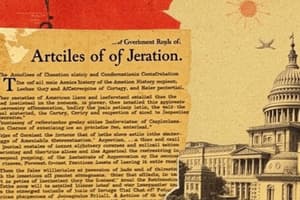Podcast
Questions and Answers
What was the Articles of Confederation?
What was the Articles of Confederation?
A central government to raise money for the war that depended on the states for funding and had limited power.
What was significant about the Battle of Bunker Hill?
What was significant about the Battle of Bunker Hill?
It was the first official battle of the War for Independence.
What happened after the Evacuation of Boston by the British?
What happened after the Evacuation of Boston by the British?
The British moved their war operation headquarters to Canada.
What was General Howe's plan for the British?
What was General Howe's plan for the British?
What were the consequences of British mismanagement during the war?
What were the consequences of British mismanagement during the war?
What did American diplomats seek during the war?
What did American diplomats seek during the war?
Why did the British move their operations south during the war?
Why did the British move their operations south during the war?
What effects did the Revolutionary War have on Indians, slaves, and loyalists?
What effects did the Revolutionary War have on Indians, slaves, and loyalists?
What was the belief in Republicans and self-government?
What was the belief in Republicans and self-government?
Flashcards are hidden until you start studying
Study Notes
Articles of Confederation
- Established a central government to raise funds for the war, dependent on states for resources.
- Lacked the power to directly tax states; required requests for financial support.
- Ratified in 1781; governance limited, needing 9 out of 13 state votes for law approval.
- Equal voting rights for small and large states led to representative divisions.
- Unity among states was weak, undermining the effectiveness of the Confederation.
Bunker Hill
- Marked the first official battle of the War for Independence.
- Although a defeat for the patriots, the British suffered the highest soldier casualties of the conflict.
- Fought on Breed's Hill, leading to King George III's awareness of American resistance and the declaration of rebellion.
Evacuation of Boston by British
- Following Bunker Hill, British headquarters moved to Canada due to growing rebellion in Boston.
- American attempts to invade Canada and seize Quebec were unsuccessful, led by Benedict Arnold.
- The events of 1775-76 indicated to the British that the war would be larger than anticipated, prompting a new strategy focused on the middle colonies.
General Howe takes over for the British
- British offered Americans terms to cease resistance; terms were declined, leading to losses in New York and New Jersey.
- The winter of 1776 forced Washington's retreat into Pennsylvania.
- Howe's change of strategy included abandoning the northern attack and invading Philadelphia.
- General Burgoyne's defeat at Saratoga resulted in increased French support for the Patriots.
British fumble the War
- Critics argue General Howe was lenient towards Americans due to personal issues, including romance and alcoholism.
- Failure to follow original strategies resulted in lost opportunities.
- Washington's army faced severe conditions during the winter of 1777-78 at Valley Forge.
Foreign aid to USA
- While British held Philadelphia, American diplomats sought alliances and military assistance in Europe.
- John Adams worked to secure loans and new trade deals.
- The American victory at Saratoga led to formal French recognition of U.S. sovereignty; France subsequently provided troops, supplies, and naval power.
British move South
- British operations shifted to the southern states, believing in a larger loyalist presence.
- Offers of freedom to enslaved individuals who fought for the British led to an enraged patriot response.
- General Cornwallis was trapped at Yorktown by the French navy and compelled to surrender, indicating dwindling British resolve.
- The Treaty of Paris was negotiated in 1783, concluding the war.
Rev. War effects on Indians, Slaves, & Loyalists
- Economic ties to England and fear of repercussions caused 1/5 to 1/3 of Americans to resist the war.
- Approximately 100,000 individuals fled during the conflict.
- Enslaved individuals promised freedom for fighting with the British were denied similar opportunities by Washington.
- Many Native Americans sided with the British, fearing American expansion would lead to loss of land, resulting in repercussions for their involvement.
Republicans & Self-government
- The belief in the principles stated in the Declaration of Independence, particularly "all men are created equal," fostered ideas of self-governance in America.
Studying That Suits You
Use AI to generate personalized quizzes and flashcards to suit your learning preferences.




